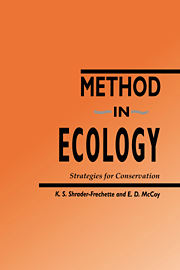Book contents
- Frontmatter
- Contents
- Acknowledgments
- 1 Introduction: What ecology can't do
- 2 Ecological concepts are problematic
- 3 Ecological theory is problematic
- 4 Ecological science is value laden
- 5 What ecology can do: The logic of case studies
- 6 Ecology and a new account of rationality
- 7 Objections to ethical rationality in ecology
- 8 A case study: The Florida panther
- 9 Policy aspects of the Florida-panther case
- 10 Conclusions
- References
- Name index
- Subject index
- Revisions (1993 printing)
7 - Objections to ethical rationality in ecology
Published online by Cambridge University Press: 08 January 2010
- Frontmatter
- Contents
- Acknowledgments
- 1 Introduction: What ecology can't do
- 2 Ecological concepts are problematic
- 3 Ecological theory is problematic
- 4 Ecological science is value laden
- 5 What ecology can do: The logic of case studies
- 6 Ecology and a new account of rationality
- 7 Objections to ethical rationality in ecology
- 8 A case study: The Florida panther
- 9 Policy aspects of the Florida-panther case
- 10 Conclusions
- References
- Name index
- Subject index
- Revisions (1993 printing)
Summary
john stuart mill, in his 1859 classic On Liberty (Mill 1986, pp. 60–61), argued that the surest way of getting to the truth was to examine all the important objections that could be brought against each candidate opinion. He believed that dogmatism, orthodoxy, and ideology are the enemies of science and philosophy, precisely because their proponents fail to consider objections to their positions. Gordon Airport (1950, p. 59) made a similar point in a more psychological way; he said that commitments were “mature” only if they were open-ended and able to take account of objections to them. In this chapter, we examine the most important objections likely to be brought against our claim that, in situations of ecological uncertainty with potentially grave consequences, where avoiding both types of error is impossible, ecologists have a prima-facie ethical obligation to minimize type-II statistical error, or public risk. In other words, we argue that ecologists ought to follow ethical as well as scientific rationality, in part because our duties to the public and to preservation are primary. Therefore, ecological decisionmaking under uncertainty ought to reflect this fact. Ecological rationality, we explain, is not the same as that in much of science, because ecological decisions often have consequences that affect our duties to others, our own rights, and ethical ideals. Because they often affect welfare, both ethical and epistemological considerations need to be taken into account. Hence, we argue that ecology typically requires (what we defined in the last chapter as) “ethical rationality.” Against these conclusions, some scholars are likely to object on a variety of grounds.
- Type
- Chapter
- Information
- Method in EcologyStrategies for Conservation, pp. 170 - 197Publisher: Cambridge University PressPrint publication year: 1993

